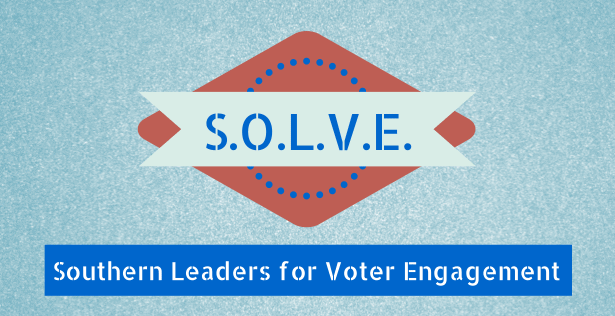Ignited by the June 2013 US Supreme Court decision invalidating Section 4 of the Voting Rights Act and subsequently ratified state-based voter suppression laws, The Southern Partners Fund, Southern Coalition for Social Justice, and other organizations have formed an unprecedented, multidisciplinary partnership to equip adversely affected communities in the South. This partnership, Southern Leadership for Voter Engagement (SOLVE), endeavors to combine skills building sessions, catalyst grants, coordinated local actions, and strategy networking opportunities, with the capacity to impact the entire southern region’s culture of voting rights.

On May 9-10, 2014, the first SOLVE convening was held in Atlanta. 60 Voting Rights advocates from fifteen states and Washington, D.C. came together for the two-day intergenerational, interdisciplinary and intersectional meeting designed to build a new southern strategy to combat voter suppression. The agenda included an examination of the current landscape for fighting voter suppression efforts, opportunities to connect advocates with legal and civic engagement resources, a deep assessment of state-by-state capacity to address voting rights challenges, opportunities for strategic coordination and a collectively determined effort to improve the recently introduced Voting Rights Act Amendment.
The group’s diversity allowed for a series of learnings beyond the agenda.
- Cross-generational work is integral because each age group has a different perception of both the challenges facing voters and their potential solutions. It also allows the institutional memory of the Civil Rights movement to be passed along to emerging leaders.
- Another observation was the advantage of bringing together people from so many parts of the U.S. Many participants spoke of the value in finding that other communities in other states were the facing similar problems to their own. “I thought we were the only state facing that challenge – it’ s great to know that we’re not alone and that we have allies to help us forge creative solutions,” said one attendee.
- While every state has its own unique voting laws, barriers to voting are often essentially the same from one state to another. By finding commonality, the group was able to move forward with a renewed sense of solidarity and unity of purpose.
It is hoped that SOLVE convenings will be an annual occurrence so that the group can talk about what works, what doesn’t, and what can be improved. The need to reconvene is buttressed by the ever-changing nature of voting laws and the fact that new challenges may always be on the horizon.
The SOLVE Conference was made possible, in large part, due to generous support from the Ford Foundation and the Open Society Foundations.

